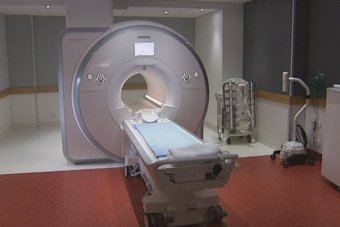The Tasmanian head of the Australian Medical Association (AMA) has rejected the assertion one-third of Australia’s annual health budget is wasted.
Four Corners reported $46 billion of the nation’s $155 billion budget was being wasted and that many people were receiving tests or treatments they did not need, some of them harmful.
The program reported since GPs were given permission to order MRI scans three years ago, the number of scans went from zero to more than 150,000 in 12 months, with an estimated half of them unnecessary.
AMA Tasmania boss Tim Greenaway rejected the claim that a third of Australia’s health budget was being wasted.
He said he accepted that there was an estimate on waste within the health system internationally but there was no data for Australia.
“Those figures come from the United States,” he said.
“And medicine, I think, as everybody knows, is extremely different in this country to the sort of medicine that’s practised in the United States,” he said.
Investigation key findings:
- The annual health budget is almost $155bn. Four Corners has found that nearly one-third of that — about $46bn — is being wasted.
- Many of us are receiving tests or treatments we don’t need, and some of these are harmful.
Since GPs were given permission to order MRI knee scans three years ago, the number of scans has gone from zero to over 150,000 in the past year. It’s estimated that at least half are unnecessary. - Knee replacements cost up to $23,500 per procedure and last year cost the public and private health systems more than $1 billion — not far short of 1 per cent of the national spend on health. About 20 per cent may be unnecessary.
The ABC’s Dr Norman Swan said the estimate used was based on international experts such as Professor Don Berwick, who argued the range of wastage was 20 to 40 per cent, with the US at the high end.
He said Professor Adam Elshaug, who is an international authority in this area, thinks it is 30 per cent for Australia.
The Dean of Medicine at the University of Sydney, Professor Bruce Robinson, also agreed.
He will chair the Federal Government’s upcoming Medicare Benefits Schedule Review Taskforce.
He said in a statement it was estimated 30 per cent or more of health expenditure was wasted in Australia.
“On services, tests and procedures that provide no or negligible clinical benefit and, in some cases, might be unsafe and could actually cause harm to patients,” he said.
“Sometimes this is because a procedure is out-of-date and should be removed altogether.
“In other instances the test or treatment is contemporary practice; it’s just not always necessary or appropriate in every circumstance and needs stronger rules or restrictions around its use.
“I’ve spoken to many health professionals, young and old, and there’s a growing consensus we as a profession have a responsibility to work together to ensure patients are getting the best treatments available.”
System should be continually reviewed: Professor
Associate professor Greenaway said Australia had a very good health system and the fourth longest life expectancy in the world, but that was not to say the system should not be reviewed vigorously.
“But we need an evidence base for everything that we do,” he said.
“If there is evidence that some investigations and treatments are not appropriate then by all means they ought not to be subsidised.”
“It is true that any investigation that we perform, that any treatment we give needs to be evidence based, but there is also the judgement of the individual doctor caring for the patient about what tests are appropriate in what circumstances,” he said.
Dr Sebastian Seidel from The Royal Australian College of General Practitioners (RACGP) Tasmania Faculty welcomed the Four Corners report.
“It’s actually a commonsense approach to review the Medicare rebates, the RACGP has been calling for this for a very long time now,” he said.
He said it was time to stop politicising health.
“We have to have a more pragmatic approach,” he said.
“And for taxpayers it means funds need to follow where the evidence is.
“So we shouldn’t be funding any treatments or investigations that do not have any evidence.”
He said there was a double up of certain procedures.
“And that’s quite often happening between what’s happening in the general practice and the hospital.
“Often investigations are being doubled up, for example x-rays and blood tests, so certainly there’s significant room for improvement.”
He said the Federal Government Medicare Benefits Schedule review should cover everything.
“If we look at how healthcare costs have developed in this country over the last 10 years it’s very clear that the cost of health care to the taxpayer in general practice has been steady,” he said.
“Twenty-nine dollars every month for the last decade.
“Have a look at what hospital costs are, they have quadrupled over the last decade.”

